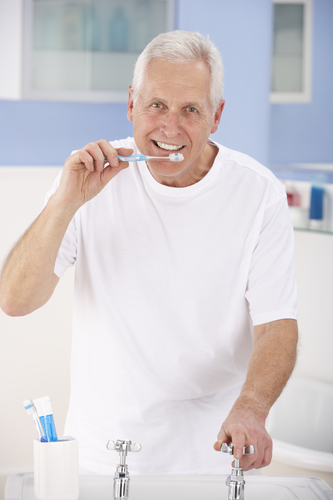 The more we learn about connections between different aspects of our health, the more important daily brushing and flossing become. Your oral health not only dictates the appearance and function of your smile, but can also impact other parts of your body and common conditions. While new studies aren’t yet definitive (they require more background research and the support of additional findings), we take cues from their suggestions to better care for ourselves today.
The more we learn about connections between different aspects of our health, the more important daily brushing and flossing become. Your oral health not only dictates the appearance and function of your smile, but can also impact other parts of your body and common conditions. While new studies aren’t yet definitive (they require more background research and the support of additional findings), we take cues from their suggestions to better care for ourselves today.
Seniors have a lot on their plates when it comes to self-care. What if tending to your daily oral hygiene helped keep you mentally strong? Researchers have evaluated studies from the last 25 years and found that oral health could be linked to changes in cognitive health. Evidence shows that dental health problems are associated with incidences of dementia. This could be because ramifications of poor oral health (poor nutrition because the patient is unable to chew properly, systemic diseases like diabetes and heart disease) are associated with cognitive function, or the cause could be something else entirely. But while scientists continue to gather evidence, we can react by focusing on our healthy smiles.
How to Prioritize Healthy Teeth As You Age
- Get dental products that work for you – If you have arthritis or limited hand movement, flossing and brushing can become trickier to complete. But today’s dental offerings have a product for every patient. Whether you’d be more comfortable with a floss holder, a water flosser, an electric toothbrush, or another aid, we’ll find the option that’s right – just ask for recommendations.
- Schedule regular exams – We can only help you if you visit our office. Be sure to keep up with your regular appointments so that we have a chance to monitor your teeth and gums, and spot early symptoms of disease.
- Be on the lookout for dry mouth – Dry mouth, a lack of adequate saliva in the mouth, is a common side effect of many medications. Insufficient saliva creates a dangerous environment in your mouth, with bacteria giving rise to acids that erode enamel. If you notice your mouth feeling dry, be sure to drink plenty of water and ask us about a medicated mouthwash.
- Keep up with your changing teeth and gums – You know your mouth better than anyone else. If you notice that something seems different, contact us for professional help.